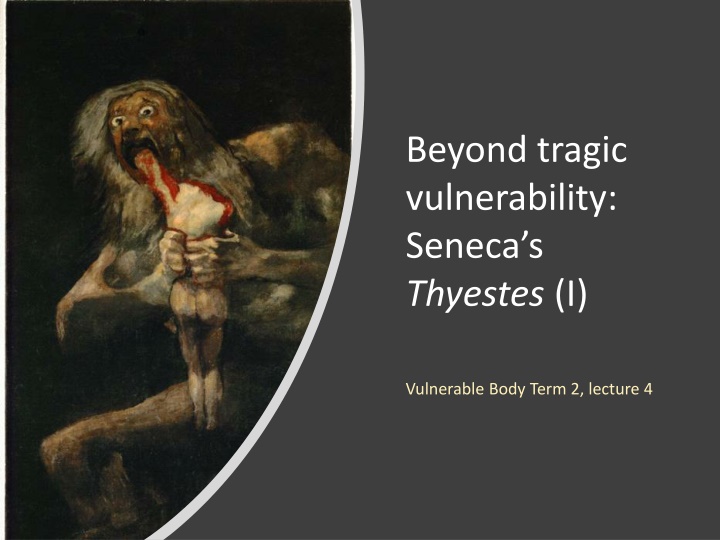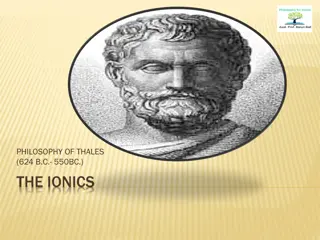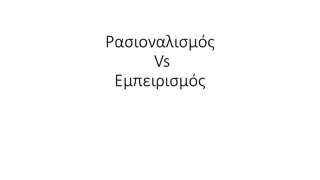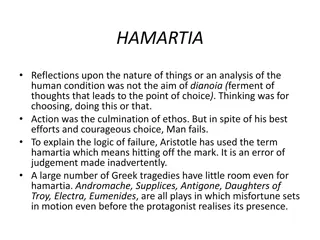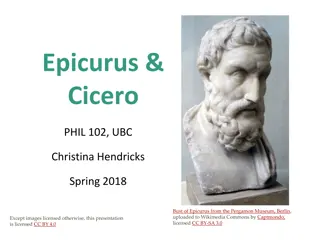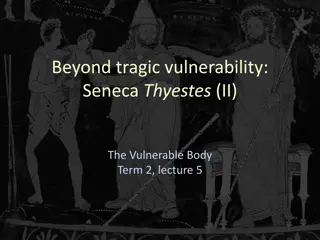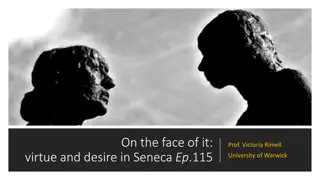Insights into Seneca the Younger and His Philosophical Tragedies
Explore the life and works of Seneca the Younger, a prominent Roman philosopher, and playwright. Delve into his tragedies, such as Thyestes, and contemplate the intersection of politics, philosophy, and allegory in his works. Witness the challenging of Stoic principles and the portrayal of characters torn apart by their emotions. Embrace the rich tapestry of Seneca's legacy through his surviving works and historical events that shaped his tumultuous life.
Download Presentation

Please find below an Image/Link to download the presentation.
The content on the website is provided AS IS for your information and personal use only. It may not be sold, licensed, or shared on other websites without obtaining consent from the author.If you encounter any issues during the download, it is possible that the publisher has removed the file from their server.
You are allowed to download the files provided on this website for personal or commercial use, subject to the condition that they are used lawfully. All files are the property of their respective owners.
The content on the website is provided AS IS for your information and personal use only. It may not be sold, licensed, or shared on other websites without obtaining consent from the author.
E N D
Presentation Transcript
Beyond tragic vulnerability: Seneca s Thyestes (I) Vulnerable Body Term 2, lecture 4
Seneca the Younger Key dates/facts, 4BCE-56CE Born btw 4 and 1 BCE (Cordoba, Spain) Son of Seneca the Elder, uncle of poet Lucan. c.19CE, began to embrace philosophy. 31: began a political career, making rapid progress. 41: banished by Claudius to Corsica 49: recalled after Messalina overthrown. Takes up role as Nero s tutor 54: Claudius dies, Nero becomes emperor, Seneca becomes official speechwriter. 56: Seneca takes Suffect Consulship
De clementia, De beneficiis, De constantia sapientis, De tranquillitate animi, De otio, De vita beata, Epistulae Morales ad Lucilium, Naturales Quaestiones. Philosophical prose Apocolocyntosis Surviving Works Satire Branch E: Hercules Furens, Troades, Phoenissae, Medea, Phaedra, Oedipus, Agamemnon, Thyestes, Hercules Oetaeus. Branch A: above 9 plays in a different order, plus the historical tragedy Octavia (with Hercules Oetaeus, not thought to be by Seneca) Tragedy
57-65CE 55: Nero murders Britannicus 59: Nero murders Agrippina 62: Burrus dies in mysterious circumstances 62: Seneca requests permission to retire 64: disastrous fire of Rome 65: the plot against Nero led by C.Calpurnius Piso discovered, Seneca forced to suicide
The death of Seneca (Rubens 1612)
How political/allegorical is it? Issues in the study of Senecan tragedy Were these plays actually performed, or (not) intended to be performed? Tragedy and philosophy Style and dramatic form: tradition and innovation Intertextuality
Philosophical tragedy? Stoic imperturbability is put to the test as characters are torn apart by their emotions. Indictment of Stoicism s failure to account for the world as it is? Stoicism taken to extreme? E.g. Medea/Atreus as the monstrous, perverted Stoic? Or does Seneca paint portraits of Stoic failures, figures who misinterpret Stoic teachings?
Tantalus (Gioacchino Assereto 1630s/40s)
Precedents for Senecas Thyestes Sophocles wrote an Atreus and a Thyestes in Sicyon. Euripides wrote a Thyestes and a Plisthenes Ennius wrote a Thyestes and Accius an Atreus. Varius Rufus Thyestes is known from the Augustan period (apparently staged as part of Octavian s triumph after Actium). An Atreus by Pomponius Secundus was possibly written within a few years of Seneca s play.
Atreus asserts his supreme power by reducing Thyestes to the ontological status of a woman, or a female/feminized body, at her most vulnerable. I.e. Thyestes is transformed, without his consent, into a pregnant, labouring body which cannot give birth . Vulnerable bodies? Atreus is reacting to threats to his own masculinity, which he perceives as inflicting an intolerable vulnerability. Significantly, his inspiration is Procne and Philomela s revenge on Tereus, told by Ovid in Metamorphoses 6
A play about (the threat of) desire and appetite Invulnerability = male rhetorical and political power, artistic (self-)control and mastery, control over reproduction (i.e. women) and paternity. Vulnerability = a crisis of language, inarticulacy, wound, collapsed leadership, male artistic failure, loss of control over reproduction, penetrability.
Spectatorship and guilt Do we participate vicariously in the humiliation and dehumanisation of Thyestes? Do we admire Atreus, far more than we sympathise with his victim? What is it to enjoy this play? Does the play prompt us to find vulnerability disgusting? Repulsive? Horrific?
What the body knows Will Atreus transcendence of the bodily realm really seal his invincible power? And is Thyestes error that he did not listen to his body? What is this turmoil that shakes my guts? What trembles inside me? I feel a restless burden, and my breast groans with groaning not my own. Come sons, yours unhappy father calls you, come! Once I see you this pain will vanish. They interrupt, but from where? Th.999-103:
